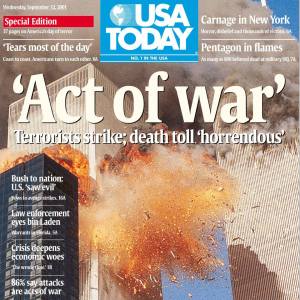From the hours immediately after the deadly terrorist attacks of September 11, 2001, news outlets have promoted a mantra that the assault on commercial and military landmarks in New York and suburban Washington “changed everything” in America.
USA Today stated as much on the day after the attacks:
 “Days that live in infamy are supposed to be found in dusty history books. Tuesday changed all that. It changed everything. Our world will never be the same.”
“Days that live in infamy are supposed to be found in dusty history books. Tuesday changed all that. It changed everything. Our world will never be the same.”
The Independent in London declared on the day after:
“Tuesday, 11 September 2001, will go down in America’s annals as the day that changed everything. It was the day that a nation’s confidence was shattered during morning rush-hour in New York City, and its defensive might was mocked at coffee-time in Washington.”
Similar accounts invoking a similar catchcry have appeared in innumerable news reports and commentaries in the 20 years since al-Qaeda terrorists commandeered commercial jets and flew two of them into the twin towers of New York’s World Trade Center. They crashed a third into the west facade of the Pentagon. A fourth hijacked jet plunged into a field in Somerset County, Pennsylvania, after passengers attempted to wrest control of the aircraft.
Nearly 3,000 people were killed in the attacks, and the lives of thousands of others were shattered or forever altered.
To posit that 9/11 “changed everything” understandably has been a way to make fathomable the shock, horror, and malignant theatricality of that infamous day, a way to invest September 11, 2001, with exceptional and enduring significance.
But exactly what “changed everything” meant remained definitionally elusive — and subject to not infrequent dispute. “Nothing changes everything,” columnist George Will wrote at the fifth anniversary of 9/11. (The activist Jesse Jackson said at the first anniversary that “9/11 did not change everything. It did change the subject.”)
 The Washington Post made a determined effort recently to pin down and elaborate on the “changed everything” mantra. It did so by devoting much of its Sunday magazine (see cover image nearby) to a collection of brief, solicited opinions purporting to describe how 9/11 wrought change in journalism, television, movies, art, fashion, theater, policing, architecture, editorial cartooning, and other fields and pursuits.
The Washington Post made a determined effort recently to pin down and elaborate on the “changed everything” mantra. It did so by devoting much of its Sunday magazine (see cover image nearby) to a collection of brief, solicited opinions purporting to describe how 9/11 wrought change in journalism, television, movies, art, fashion, theater, policing, architecture, editorial cartooning, and other fields and pursuits.
The collection was introduced with a sweeping claim that “9/11 changed the world in demonstrable, massive and heartbreaking ways.”
It was a far-reaching yet ultimately unpersuasive attempt to clarify and bring dimension to the “changed everything” catchcry. Indeed, it was striking that the Post’s collection presented only mixed evidence of significant change incontrovertibly linked to the attacks. Many entries were impressionistic; vagueness stalked more than a few contributions.
For example, one contributor wrote, “Museums have yet to return to the levels of ambition we saw before the attacks.”
Declared another contributor: “The post-9/11 fashion industry puts a premium on fresh faces and wily entrepreneurs. And while those celebrated young talents often move with reckless speed, the desire to create and a belief in the impossible were salvaged from the wreckage.”

USA Today front page, day after 9/11
Another contributor alluded to recordings of telephone calls placed by victims aboard the hijacked aircraft or trapped in the stricken Twin Towers and wrote:
“There’s no way to prove, of course, that 9/11 led more people to use the phrase ‘I love you.’ And we might not be thinking of disaster while on a routine call with Mom, Dad, a sibling, a best friend or a spouse. But it was one of the first times Americans got such a visceral window into other people’s intimate conversations — and I believe that, for many of us, it left a mark.”
The attacks of 9/11 certainly led to change — and fresh intrusions — in airport security and personal privacy. The federal government was expanded. The country fought a prolonged conflict in Afghanistan, where al-Qaeda planned the attacks.
But when considered closely, it becomes clear the 9/11 attacks did not “change everything.”
The attacks were not fatal to American political or economic power. Public opinion polls reported that after 9/11 many Americans felt a surge of patriotic fervor, a deeper commitment to the religious and spiritual side of life, and a newfound sense of political unity.
Such responses proved fleeting, however. They faded in time.
Even the Post’s collection acknowledged, perhaps unintentionally, that change after 9/11 wasn’t always so enduring. The syndicated cartoonist Steve Breen wrote, for example, that after the attacks “there seemed to be an unspoken rule that our favorite target, President George W. Bush, was off-limits. Luckily, that didn’t last long, and we were free to go after Bush (as well as Dick Cheney, John Ashcroft, Tom Ridge, etc.) unfettered.”
Gene Weingarten, the newspaper’s humor columnist, observed: “Pretty quickly [after 9/11], humor returned. It was, I think, the first return to normalcy after that ghastly day, the first good thing to happen.”
(Just a week after the 9/11 attacks, Weingarten had lamented the diminished state of humor in America. “The problem,” he wrote then, “is we are finding no humor, anywhere. When will we be able to laugh again?”)
An assessment far more tempered and thoughtful about the effects of 9/11 was offered not long ago by Anatol Lieven, a Georgetown University professor who pointed out:
“In the United States, the long-term impact of 9/11 does not compare to the great underlying tensions that have shaped American life over generations and centuries: racial tensions and oppression, fears created by immigration, concern about cultural change and the threat to religion and morality, fears about the impact of alcohol and drugs, and the Cold War.
“The impact of 9/11 rather resembles one of the ‘moral panics’ analyzed by James A. Morone in Hellfire Nation; a wave of public hysteria that, like Prohibition and McCarthyism, has receded again, leaving behind a new layer of US security institutions and practices.”
Akin to a “wave of public hysteria that, like Prohibition and McCarthyism, has receded again”: that’s a fair point — a tenable interpretation given the analytical distance allowed by the passage of 20 years.
“The events of 9/11,” Lieven observed in closing, “have not … defined the world in general, and certainly not ‘our’ world in the West.
“The truly defining factors are quite different,” he wrote, citing the “geopolitical struggle with China” and the domestic troubles of Western democracies.
What’s notable and refreshing about Lieven’s commentary is that it did not proceed from an assumption that 9/11 “changed everything.” It is instead a detached and critical assessment, of which we could use more.
More from Media Myth Alert:
- Afghanistan is ‘Biden’s Katrina’? Afghanistan is dramatically worse
- Mythmaking in Moscow: Biden says WaPo brought down Nixon
- Our incurious press
- Challenge the dominant narrative? Who, us?
- ‘Good narrative trumps good history’
- On Hearst, yellow journalism, and war
- WSJ columnist, trying to explain Trump, trips over Cronkite-Johnson myth
- Lynch blames ‘military, media’ for bogus hero story, ignores WaPo
- Pumping up Watergate’s heroic-journalist myth
- He may be arrogant, but he’s right about presentism
- Why they get it wrong

[…] Challenging the mantra that 9/11 ‘changed everything’ (posted September 10): From the first hours after the terrorist attacks of September 11, 2001, news […]